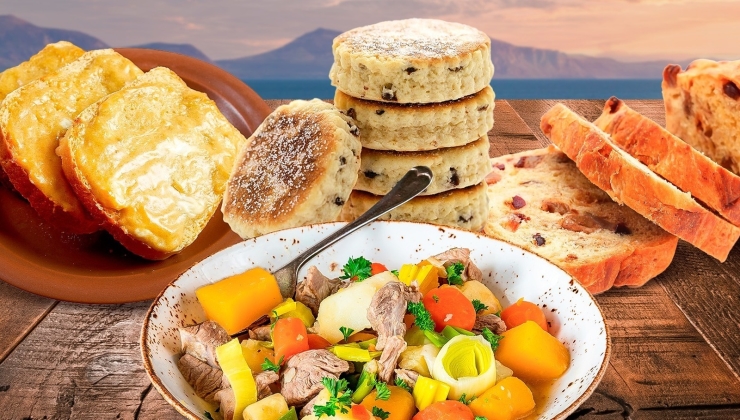Welsh cuisine offers a rich and flavorful journey through the heart of Wales, reflecting its landscapes, history, and cultural heritage. In this article, we will explore some of the most popular Welsh dishes, each providing a taste of the traditions and stories that shape this vibrant nation.
Discovering Welsh Comfort Food: A Guide to Traditional Dishes
When it comes to comfort food, Wales has a treasure trove of dishes that bring warmth and satisfaction to any table. Classics such as Cawl, a hearty stew made with lamb and vegetables, and Bara Brith, a rich fruit loaf, are staples in Welsh households. These dishes not only provide nourishment but also carry a sense of home and tradition. Cawl, often considered the national dish, is especially popular during colder months, bringing families together with its warm, comforting flavors. Meanwhile, Bara Brith, often enjoyed with a cup of tea, symbolizes the cozy, hospitable spirit of Welsh culture.
The Cultural Tapestry of Welsh Cuisine
Welsh culinary traditions are deeply intertwined with the country’s cultural heritage. The evolution of Welsh recipes and the use of local ingredients are a testament to the historical and geographical influences that have shaped the nation. For instance, the use of leeks—a symbol of Wales—dates back to ancient times and features prominently in many traditional dishes. Similarly, laverbread, made from seaweed, reflects the coastal geography and the resourcefulness of Welsh people in utilizing the natural bounty around them. The resilience and adaptability of Welsh cuisine mirror the broader narrative of Welsh history, where survival and ingenuity have always played crucial roles.
By incorporating elements of the ‘Culture of Wales‘, such as traditional music, folklore, and celebrations, we see how food is not just sustenance but a central thread in the cultural tapestry. Traditional dishes are often showcased during Eisteddfod festivals and Saint David’s Day celebrations, highlighting the pride and joy Welsh people take in their culinary heritage.
A Taste of Wales: Must-Try Dishes for Food Enthusiasts
For food lovers and tourists exploring Wales, certain dishes stand out for their unique flavors and cultural significance. Welsh rarebit, a savory dish made with melted cheese over toasted bread, is a must-try. Its rich, creamy texture, often spiked with ale or mustard, makes it a beloved comfort food. Glamorgan sausages, a vegetarian sausage made from cheese, leeks, and breadcrumbs, offer a delicious alternative that showcases the ingenuity of Welsh cuisine. Another favorite is Faggots and Peas, a traditional dish made from minced meat and offal, providing a hearty and flavorful experience.
These dishes are not just meals but stories on a plate, each bite offering a glimpse into the history and traditions of Wales. Whether enjoyed in a local pub or a high-end restaurant, these culinary delights leave a lasting impression on anyone lucky enough to taste them.
From Farm to Fork: The Local Ingredients Defining Welsh Flavors
Welsh cuisine is deeply rooted in the land, with locally sourced ingredients playing a crucial role in defining its flavors. The lush, green pastures of Wales produce some of the best lamb in the world, a cornerstone of many traditional dishes. Similarly, Aberystwyth mackerel and other seafood varieties highlight the freshness and quality of local produce.
Sustainable practices are at the heart of Welsh farming, with a focus on seasonal eating that ensures the best quality ingredients. The use of wild garlic in spring or blackberries in autumn showcases how Welsh chefs and home cooks alike celebrate the changing seasons. These ingredients not only provide exceptional taste but also reinforce a connection to the land and its rhythms.
Celebrating Welsh Gastronomy: Food Festivals and Culinary Events
Welsh food festivals and culinary events are vibrant celebrations of the nation’s gastronomic heritage. Events such as the Abergavenny Food Festival and the Cardigan Bay Seafood Festival offer a platform for both traditional and innovative Welsh cuisine. These festivals attract food enthusiasts from all over, eager to sample the rich flavors and diverse dishes of Wales.
At these events, local chefs and food producers come together to showcase their creations, often using time-honored recipes with a modern twist. Cookery demonstrations, tasting sessions, and farmers’ markets highlight the best of Welsh produce, while also promoting sustainable and ethical eating practices. These gatherings not only celebrate the culinary skills of the nation but also foster a sense of community and shared heritage.
In conclusion, Welsh cuisine is a delicious reflection of the country’s cultural heritage, offering comfort, tradition, and innovation in every dish. From the hearty stews and savory treats to the locally sourced ingredients and vibrant food festivals, the flavors of Wales provide a rich and engaging culinary experience that speaks to the soul of this proud nation. Whether you’re a food enthusiast or a cultural explorer, the culinary delights of Wales offer a journey that is both satisfying and enlightening.


